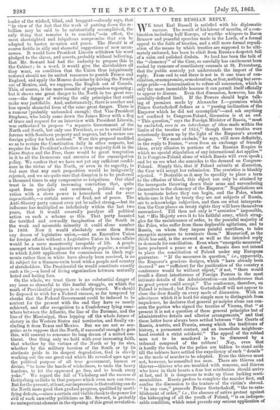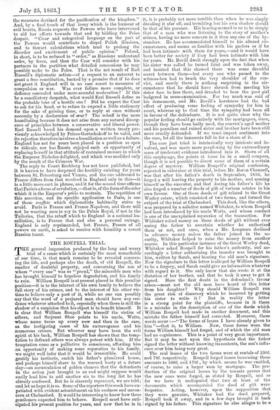THE RUSSIAN REPLY.
WE trust Earl Russell is satisfied with his diplomatic success. The result of his labour of months, of a com- bination including half Europe, of warlike whispers to Baron Brunow and peaceful speeches made in the Lords, of a formal appeal to the faith of treaties, and a still more formal repudi- ation of the means by which treaties are supposed to be ulti- mately enforced, has been to elicit from Russia a despatch full of a calm and polished disdain. So loud has been the talk of the "clemency" of the Czar, so carefully has excitement been cooled by rumours of conciliatory counsels at St. Petersburg, that the public scarcely yet understands the import of the reply. From end to end there is not in it one trace of con- ciliation, or compromise, ormoderation, or fear, nothing but sove- reign pride—a determination to refuse all concession, which is only the more immutable because it can permit itself officially to appear to discuss. Even that discussion, however, has its carefully-defined limit. If the Powers should begin talk- ing of promises made by Alexander I.—promises which Prince Gortschakoff defines as a "passing inclination of the Emperor which he did not accomplish"—and ask anything not confined to Congress-Poland, discussion is at an end. "This question," says the Foreign Minister of Russia, "must be excluded, even in an interchange of ideas made within the limits of the treaties of 1815," though those treaties were notoriously drawn up by the light of the Emperor's avowed designs. "We must exclude," he says, still more definitely, in the reply to France, "even from an exchange of friendly ideas, every allusion to portions of the Russian Empire to which no special stipulation of any international Act applies."
It is Congress-Poland alone of which Russia will even speak; and let us see what she concedes to the demand on Congress- Poland. Simply this, that if Poland submits at discretion, the Czar will accept her submission. The armistice is blankly rejected. "Desirable as it may be speedily to place a term to the effusion of blood, this object can only be attained by the insurgents throwing down their arms and surrendering themselves to the clemency of the Emperor." Negotiations are to terminate before they can begin, and the Poles, whose whole case is that by treaty they are not subjects of Russia, are to acknowledge subjection, and then see what interpreta- tion the Czar places on treaty rights they will have themselves surrendered. Till then not only is"" armistice" impossible, but "His Majesty owes it to his faithful army, which strug- gles for the maintenance of order, to the peaceful majority of the Poles, who suffer from these deplorable agitations, and to Russia, on whom they impose painful sacrifices, to take energetic measures to terminate theta." Mouravieff, as the Sigde has said, is the avowed as well as the intended reply to demands for conciliation. Even when "energetic measures" have produced a peace or a desert, Russia does not intend to place the constitution of Poland under any European guarantee. "If the measures in question," i.e., apparently, the Emperor's gracious designs, which "have already been decreed" are "sufficient for the pacification of the country a conference would be without object," if not, "there would result a direct interference of Foreign Powers in the most intimate details of the Administration—an interference that no great power could accept." The conference, therefore, on Poland is refused ; but Prince Gortschakoff will not appear to close the door finally on every mode of discussion. With an adroitness which it is hard for simple men to distinguish from impudence, he declares that general principles alone can con- cern the parties who signed the treaties of Vienna, that "at present it is not a question of these general principles but of administrative details and ulterior arrangements," and that these latter have always been settled between "the Courts of Russia, Austria, and Prussia, among which the traditions of history, a permanent contact, and an immediate neighbour- hood created a strict volidariti." The appeal of the robbed man not to be murdered is to be discussed by a tribunal composed of the robbers ! Nay, even that is hardly the truth, for the police are bidden to stand aside till the robbers have settled the expediency of such "details" as the mode of murder to be adopted. Even the thieves must not, however, be consulted too soon. There are thieves and thieves—thieves who are troubled with remorse, and thieves who have in their hearts a fear lest retribution should arrive at last, and it is dangerous to wake up those lurking senti- mentalities. Russia prefers to complete the murder first, and confine the discussion to the texture of the victim's shroud. "In any case," proceeds Prince Gortschakoff, "the re-esta- blishment of order," i.e , the absence of active protest against the kidnapping of all the youth of Poland, "is an indispen- sable condition, which must precede any serious application of the measures destined for the pacification of the kingdom." And, by a final touch of that irony which is the humour of evil hearts, Russia requests the Powers who have intervened to aid her efforts towards that end by bidding the Poles despair. "Clear and categorical language on the part of the Powers would contribute to dispel Polish illusions, and to thwart calculations which tend to prolong the disorder and excitement of public opinion." Poland, in short, is to be reduced to "order," as Russians understand order, by force, and then the Czar will consider with his partners in the partition what detailed concessions he may possibly make to the Poles. That is the net result of Earl Russell's diplomatic action—of a request to an autocrat to grant a free constitution, backed by a promise that if he does not grant it England will in no case resort to measures of compulsion or war. Was ever failure more complete, or defiance concealed under more scornful moderation ? If this be a coneiliatory despatch, what would Earl Russell define as the probable tone of a hostile one ? Did he expect the Czar to ask for his head, or to refuse to expend a little stationery for the sake of gaining time, or to reply at once without necessity by a declaration of .war? The rebuff is the more humiliating because it does not arise from any natural diverg- ence of principles between a conservative and liberal power. Earl Russell based his demand upon a written treaty pre- viously acknowledged by Prince Gortschakoff to be valid, and its rejection therefore involves a humiliation as well as a failure. England has not for years been placed in a position so open to ridicule, nor has Russia enjoyed such an opportunity of replacing herself in that attitude of restrained menace in which the Emperor Nicholas delighted, and which was modified only by the result of the Crimean War. The reply to Count Rechberg has not been published, but it is known to have deepened the hostility existing for years between St. Petersburg and Vienna, and the one addressed to France differs from that received in England only in this—it is a little more curt in phrase, and it for the second time affirms thatParis is afocus of revolution,—that is, of the form of disorder 'which it is the Emperor's pride to restrain. The repetition of this assertion, and its specific application to Paris, is one of those souffle& which diplomatists habitually strive to avoid. Paris is France and France Napoleon, and there will 3iot be wanting men to say in the Palais Royal, if not in the Tuileries, that the rebuff which to England is a national hu- ,miliation, is to France that and also a personal outrage. England is only reprimanded, but France, France of all powers on earth, is asked to receive with humility a covert Russian taunt.































 Previous page
Previous page